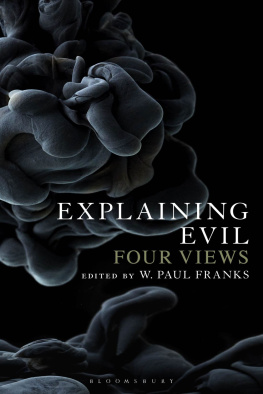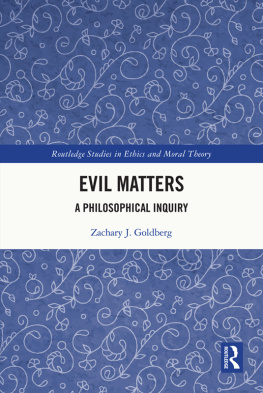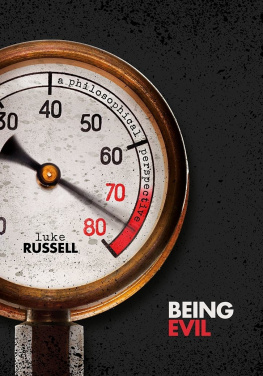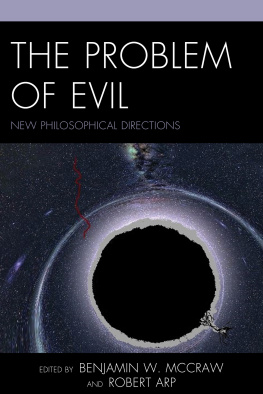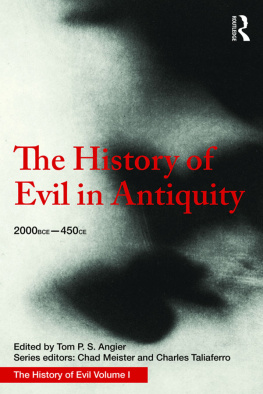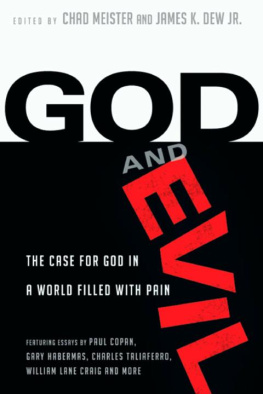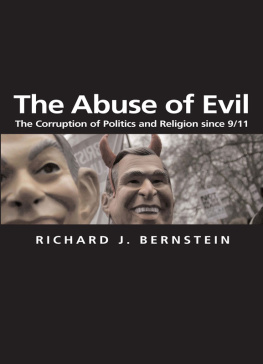Explaining Evil
ALSO AVAILABLE FROM BLOOMSBURY
God, Existence, and Fictional Objects , by John-Mark L. Miravalle
Wittgenstein, Religion and Ethics , edited by Mikel Burley
Philosophy of the Bhagavad Gita , by Keya Maitra
The Selected Writings of Maurice OConnor Drury , edited by John Hayes
Explaining Evil
Four Views
Edited by W. Paul Franks

In memory of W.H.F.
Contents
Richard Brian Davis is Professor of Philosophy at Tyndale University College. Professor Davis has published over thirty journal articles/book chapters and five books. Some of the latter include Four Views on Christianity and Philosophy (Zondervan, 2016), Loving God with Your Mind: Essays in Honor of J.P. Moreland (Moody, 2014), 24 and Philosophy (Blackwell, 2007), and The Metaphysics of Theism and Modality (Peter Lang, 2001).
Paul Helm is the former professor of the History and Philosophy of Religion at Kings College, London. He has authored numerous journal articles and books including: Calvin: A Guide for the Perplexed (T&T Clark, 2008), Faith with Reason (Cambridge, 2000), Belief Policies (Cambridge, 1994), The Providence of God (IVP Academic, 1994), and Eternal God: A Study of God without Time (Oxford, 1988).
Michael Ruse is Professor of Philosophy at Florida State University. Professor Ruse has published numerous journal articles/book chapters and authored or edited over fifty books. Some of his more recent books include: Darwinism as Religion: What Literature Tells Us about Evolution (Oxford, 2017), The Cambridge Handbook to Evolutionary Ethics (2017), Science and Religion in Conflict? (Oxford, 2016), Atheism: What Everyone Needs to Know (Oxford, 2015), and The Cambridge Encyclopedia of Darwin and Evolutionary Thought (Cambridge, 2013).
Erik J. Wielenberg is Professor of Philosophy at DePauw University. He has authored three books: Robust Ethics: The Metaphysics and Epistemology of Godless Normative Realism (Oxford, 2014), God and the Reach of Reason: C.S. Lewis, David Hume, and Bertrand Russell (Cambridge, 2008), and Value and Virtue in a Godless Universe (Cambridge, 2005), and over thirty journal articles/book chapters.
Many people are deserving of thanks for this book becoming a reality. I am deeply grateful for the hard work of each of the authors who not only provided helpful insight into this topic, but also did so while not missing any of the deadlines a book of this nature demands. I have learned much about evil, and a host of associated issues, because of their thoughtful contributions. I would like to also thank two of my former professors: Linda Zagzebski, who was instrumental in helping me to think more clearly about the problem of evil, and Neera Badhwar, who first introduced me to the various issues concerning evil in general. Thanks are also due to the Faculty Research Committee at Tyndale University College for granting me a sabbatical during which I was, among other things, able to see this project to completion. Finally, I would like to thank my wife Tina Marie for her faithful support and encouragement, and my sons Alexander, Oliver, and Samuel who are a constant source of joy.
W. Paul Franks
It is not terribly difficult to establish that the world contains evil. Unfortunately, its all too easy to find yet another instance of immense harm befalling someone for no justifiable reason. While working on this introduction, the shooting at Marjory Stoneman Douglas High School in Parkland, FL, unfolded. Seventeen people, both students and teachers, were needlessly killed. Why do such terrible things occur? What about the various evils that result in far greater suffering, or even those that result in far less? When confronted with such evils it is commonplace, and natural, to seek out an explanation. Some explanations are meant to account for why some particular evil occurred, whereas others take a broader approach and are meant to give reasons for evils existence in general. This book is focused on the latter task.
Establishing that there is evil is easy; determining why there is evil is a much more difficult task. Those familiar with the literature on the problem of evil will know that this has been a focus of Christian theists for centuries and with good reason. According to Christian theism, there is a being who exists apart from this universe, who cares about human welfare, and has a say in the goings-on of this universe. In addition, this being is said to be perfectly morally good, omniscient, and omnipotent. This alone is sufficient to give a rough approximation of what has come to be known as the problem of evil. Presumably, an omnipotent being would be able to prevent evil, an omniscient being would know how to prevent evil, and a perfectly good being would want to prevent evil. So why, then, is there evil?
In most contemporary discussions, problems like the one outlined above tend to amount to an argument for atheism since, it is alleged, one is incapable of justifying the belief that God exists Advocates of either type of problem claim that the argument gives an individual reason to believe that God does not exist.
As one would expect, Christian theists have not remained silent on this issue and there is no shortage of responses to these problems. However, before going any further it is important to note that this is not a book dealing with solutions to the problem of evil in either its logical or evidential forms. In fact, other than the brief synopsis above, you wont find the problem of evil defended, refuted, or even stated. While the four authors contributing to this book are grappling with the presence of evil in this world, they are not doing so only in the context of evil somehow generating a problem for theism. There are two reasons for this. First, the task of explaining evil is not something that falls to theists alone. Upon learning of another mass shooting or terrorist attack, theists arent the only ones wondering why such things occur. Non-theists are just as prone to seek out explanations for evil as anyone else.
The second reason for taking a different approach than many problem of evil books follows closely on the first. In many discussions about the problem of evil its not uncommon for the participants to never get around to stating what they believe are the actual reasons for evil. Instead, what often happens is that an atheist lays out what appears to be a problem for theism, and theists too easily content themselves with focusing on some alleged problem with that problem for theism. While this is a worthwhile activity, taken alone it doesnt actually give us what we were initially looking foran explanation for evil. Instead of simply focusing on problems with other accounts of evil, the aim of this book is for each contributor to present his own positive account of evil and then also be able to respond to criticisms to it.
While this is not a typical book on the problem of evil, it is certainly still relevant to that topic. Those seeking theistic solutions to the problem of evil will find in Paul Helm and Richard Brian Davis resources for that task, even though resolving an argument against theism is not their primary aim. So, in some sense, these two theistic contributors will add to the ever-growing literature on the problem of evil, but they go about doing so in a different way. Their primary goal is to show how evil fits within their theistic worldview. That is, for both Davis and Helm the question to answer is not Given evil, how can there be a God? but instead, Given God, how can there be evil?

